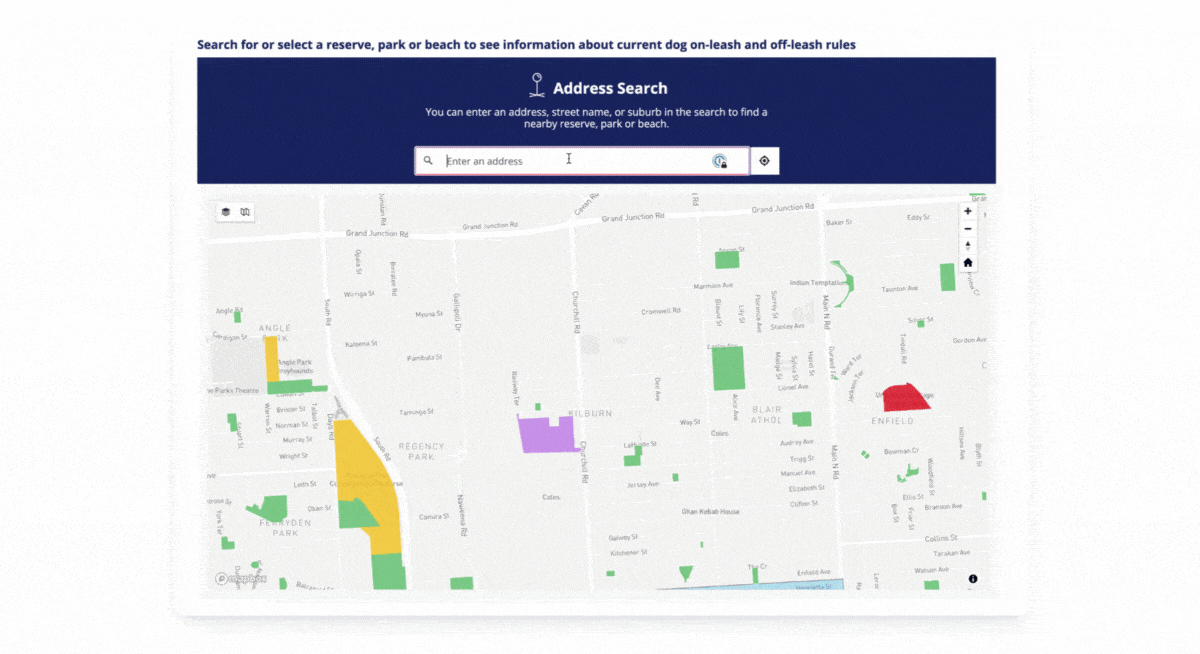The Initative
The City of Port Adelaide Enfield launched the Pups in Public Places project to gain feedback from the community for the on and off-leash rules for dogs in open spaces, whilst balancing the needs of all visitors. As a large council area with approximately 400 reserves, the City of PAE was eager to develop a holistic view of the community’s needs and experience.
Pups in Public Places invited the community to provide their ideas and feedback to help get the balance right in determining which open public areas should be on-leash, off-leash, or dog prohibited.
The Goal
The City of PAE is seeking to create people and pet-friendly places and support dogs in open spaces in a safe and responsible way. The engagement was open to anyone who uses or visits the City of PAE’s open spaces, not just residents and dog owners. The feedback would be used to inform Council’s final decision on on-leash and off-leash areas within PAE.
It would also be considered alongside the City of PAE’s organizational knowledge, experience, and expertise around the management and appropriate use of community open spaces as part of their Open Space Strategy 2020 – 2025. Consideration would also include community needs and benefits, surrounding amenities and infrastructure, and protection of the natural environment.

The Approach
The City of PAE needed an easy process to help communicate detailed information on specific reserves and their current rulings and allow the community to comment. The City set up their Pups in Public Places project and utilised our PolicyScape add-on to create an interactive, visual experience in which their community could explore all reserve locations via a map
This allowed the community to easily explore current rulings for specific reserves, parks, and beaches before opting in to provide their own detailed feedback on their locations of interest via a short survey.
The community could also respond to a simple survey about key locations, such as the beach and grassed foreshore. The community has historically held divided opinions on these areas, so having this additional survey open was essential.
To promote the project, the City of PAE sent 8,672 emails to registered dog owners in the area, sent 64 emails to key stakeholders from community groups and local sporting clubs, held 24 pop-up events across 14 locations, and shared two social media posts.
Providing numerous touchpoints for the community to get involved allowed the City of PAE to spark conversations, demystify negative perceptions, and encourage the public to provide their insights online.
“The PolicyScape add-on enabled us to have an exploratory approach available for the community. They could self educate and learn before they provided feedback. This resulted in more context and more informed answers.”
– Robert Kretschmer, Community Engagement Coordinator
The Result
The City of PAE received 685 contributions for the Pups in Public Places engagement in 6 weeks. A significant portion of responses came from the survey. However, the PolicyScape map generated 360 responses regarding 63 open spaces.
The feedback has also revealed unexpected insights for specific locations, challenging The City’s own hypotheses about the community’s needs and the status quo of historic rulings.
All feedback collected from the engagement will be used to inform Council’s final decision on on-leash and off-leash areas within the City of PAE. Recommendations will be made to elected members to deliver the right outcome for the community.
The City believes in creating a positive community engagement experience for the community to increase positive conversations and deliver better outcomes. The City also takes a proactive approach to close the loop with all contributors and has already presented a summary of findings.
“Well, we seemed to have had the wrong idea, and the community didn’t agree. But that’s okay, because this is the true value of this experience, and their solution will still work because this is the right outcome for them.”
– Brenton Thomass, Manager Of Community And Environmental Health



